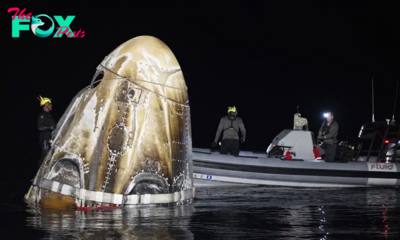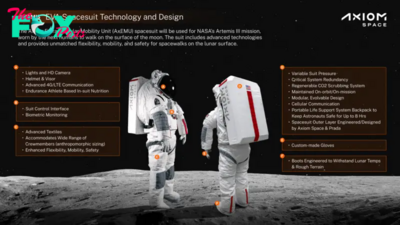Science
Jupiter's moon Europa lacks oxygen, making it less hospitable for sustaining life
Europa, Jupiter's ice-cloaked ocean moon, contains far less oxygen than previously thought, making it a poor candidate for sustaining alien life.
Researchers came to this conclusion after analyzing data compiled from NASA's Juno mission. Calculations from a 2022 flyby of the Jovian moon revealed that Europa's frozen surface only produces about 26 pounds (12 kilograms) of oxygen per second, according to a study published March 4 in the journal Nature Astronomy.
This number is far lower than previous computer model predictions, which estimated the surface produced 2,205 pounds (1,000 kg) of oxygen per second. That implies the moon's life-sustaining oxygen supply is "more like a trickle, not a torrent," according to Scientific American.
"It's on the lower end of what we would expect," lead study author Jamey Szalay, a plasma physicist at Princeton University, told The New York Times.
However, scientists remain optimistic that Jupiter's fourth largest moon, which is perhaps best known for having an underground ocean, could still harbor life in the form of microbes and that the oxygen scarcity is "not totally prohibitive" for habitability, Szalay added.
Related: Missions to the moon, Mars, Jupiter and more: These are the coolest space missions in 2024
Unlike here on Earth, where the photosynthesis of plants, algae and cyanobacteria pump life-sustaining oxygen into the atmosphere, on Europa "charged particles from space bombard the moon's icy crust," causing the frozen surface to release hydrogen and oxygen molecules, according to The New York Times.
—NASA spacecraft snaps gorgeous new photo of Jupiter's moons Io and Europa
—NASA finds organic compounds seeping up from hidden ocean on Jupiter's icy moon Ganymede
—James Webb telescope spots enormous jet stream faster than a Category 5 hurricane on Jupiter
"The ice shell is like Europa's lung," Szalay told The New York Times. "The surface — which is the same surface that protects the ocean underneath from harmful radiation — is, in a sense, breathing."
Even though there are currently no plans for Juno to pass by Europa again, NASA's upcoming Europa Clipper mission will launch later this year and is scheduled to arrive in Jupiter's orbit by 2030. That mission will help "determine if Europa has conditions that could be suitable for life," according to the statement.
-

 Science2d ago
Science2d agoInside Capitol Hill’s Latest UFO Hearings
-

 Science2d ago
Science2d agoYou Won’t Want to Miss the Leonid Meteor Shower. Here’s How and When You Can See It
-

 Science3d ago
Science3d agoHere’s What Trump’s Win Means for NASA
-

 Science6d ago
Science6d agoWhy Risky Wildfire Zones Have Been Increasing Around the World
-

 Science6d ago
Science6d agoIt’s Time to Redefine What a Megafire Is in the Climate Change Era
-

 Science1w ago
Science1w ago4 Astronauts Return to Earth After Being Delayed by Boeing’s Capsule Trouble and Hurricane Milton
-

 Science1w ago
Science1w agoThe Elegance and Awkwardness of NASA’s New Moon Suit, Designed by Axiom and Prada
-

 Science1w ago
Science1w agoSpaceX Launches Its Mega Starship Rocket. This Time, Mechanical Arms Catch It at Landing



























